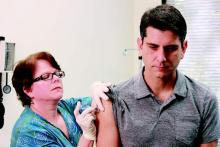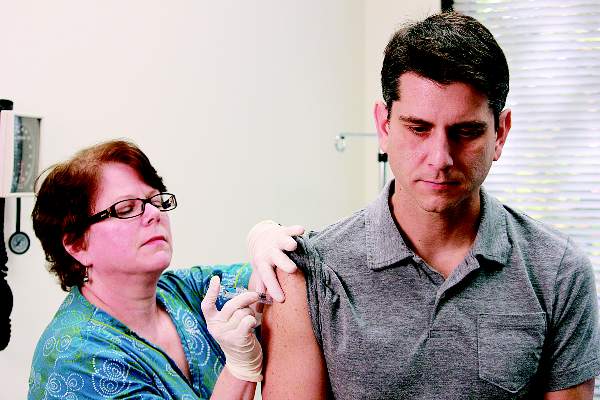User login
Every month sees new apps launched by established medical organizations. Although these apps don’t have data to confirm their usefulness, at least they come from known and trusted sources. Here’s a roundup of some of the latest. You decide whether or not they’re worth a try.
The Centers for Disease Control and Prevention (CDC) makes it easier for clinicians to find recommended immunization schedules for adults and children through its free CDC Vaccine Schedules app. Look up contraindications to vaccination or catch-up schedules for children and adolescents, or search recommendations for adults based on the presence of diabetes, HIV, pregnancy, or other conditions, among other features.
The free Spot a Stroke FAST app from the American Heart Association and American Stroke Association can help patients and family members identify the signs and symptoms of stroke in order to get timely help. Named after the mnemonic FAST (Face, Arm, Speech, Time), the app includes the ability to phone 911, with a time stamp showing when the call was made, features that may help clinicians in management decisions.
The American College of Cardiology’s free Guideline Clinical App includes three recently updated practice guidelines in its first iteration, on the management of heart failure, assessment of cardiovascular risk, and the treatment of blood cholesterol.
Clinical pearls for emergency medicine developed by the University of Maryland are available in the university’s free app UMEM Pearls.
The U.S. Substance Abuse and Mental Health Services Administration’s free KnowBullying app guides parents and educators on how to start easy, meaningful conversations with children about preventing or responding to bullying. Parents and caregivers who spend at least 15 minutes a day talking with a child can help build a strong relationship that can help prevent bullying, the group says.
The CDC’s free Heads Up app can help parents and caregivers spot the signs and symptoms of a concussion and learn what to do if you think a child or adolescent may have a concussion or other serious brain injury. Bonus: It also offers information on picking the right helmet for specific activities.
While we’re on the topic of pediatrics – the American Academy of Pediatrics (AAP) offers a slew of apps for physicians and parents. One of the most recent is the free AAP Journals app, which received an overall positive but mixed review on iMedicalApps.com.
Residents in the states of Washington or Minnesota can use Planned Parenthood’s free Planned Parenthood Care app in a pilot program that lets them connect with clinicians via video to get birth control methods sent through the mail – contraceptive pills, patches, or rings. The video visit costs $45.
Women who are pregnant or nursing and want to eat fish may like the free Fish4Health app from Purdue University that provides information on the benefits and safety of various fish species and helps them track their intake of healthy fats and mercury.
The European Society of Human Reproduction and Embryology offers its members a free app and/or web-based guidelines on the “Management of Women with Endometriosis.” The app summarizes the 83 recommendations in the guidelines and offers a decision-aid on six key issues in endometriosis.
Among a bevy of apps from the American Red Cross, the recent free Blood Donor app streamlines the process of donating blood, offers rewards to donors from participating retailers, and includes social media features that help promote giving blood.
Is there a new app that you think we should highlight? Let us know.
On Twitter @sherryboschert
Every month sees new apps launched by established medical organizations. Although these apps don’t have data to confirm their usefulness, at least they come from known and trusted sources. Here’s a roundup of some of the latest. You decide whether or not they’re worth a try.
The Centers for Disease Control and Prevention (CDC) makes it easier for clinicians to find recommended immunization schedules for adults and children through its free CDC Vaccine Schedules app. Look up contraindications to vaccination or catch-up schedules for children and adolescents, or search recommendations for adults based on the presence of diabetes, HIV, pregnancy, or other conditions, among other features.
The free Spot a Stroke FAST app from the American Heart Association and American Stroke Association can help patients and family members identify the signs and symptoms of stroke in order to get timely help. Named after the mnemonic FAST (Face, Arm, Speech, Time), the app includes the ability to phone 911, with a time stamp showing when the call was made, features that may help clinicians in management decisions.
The American College of Cardiology’s free Guideline Clinical App includes three recently updated practice guidelines in its first iteration, on the management of heart failure, assessment of cardiovascular risk, and the treatment of blood cholesterol.
Clinical pearls for emergency medicine developed by the University of Maryland are available in the university’s free app UMEM Pearls.
The U.S. Substance Abuse and Mental Health Services Administration’s free KnowBullying app guides parents and educators on how to start easy, meaningful conversations with children about preventing or responding to bullying. Parents and caregivers who spend at least 15 minutes a day talking with a child can help build a strong relationship that can help prevent bullying, the group says.
The CDC’s free Heads Up app can help parents and caregivers spot the signs and symptoms of a concussion and learn what to do if you think a child or adolescent may have a concussion or other serious brain injury. Bonus: It also offers information on picking the right helmet for specific activities.
While we’re on the topic of pediatrics – the American Academy of Pediatrics (AAP) offers a slew of apps for physicians and parents. One of the most recent is the free AAP Journals app, which received an overall positive but mixed review on iMedicalApps.com.
Residents in the states of Washington or Minnesota can use Planned Parenthood’s free Planned Parenthood Care app in a pilot program that lets them connect with clinicians via video to get birth control methods sent through the mail – contraceptive pills, patches, or rings. The video visit costs $45.
Women who are pregnant or nursing and want to eat fish may like the free Fish4Health app from Purdue University that provides information on the benefits and safety of various fish species and helps them track their intake of healthy fats and mercury.
The European Society of Human Reproduction and Embryology offers its members a free app and/or web-based guidelines on the “Management of Women with Endometriosis.” The app summarizes the 83 recommendations in the guidelines and offers a decision-aid on six key issues in endometriosis.
Among a bevy of apps from the American Red Cross, the recent free Blood Donor app streamlines the process of donating blood, offers rewards to donors from participating retailers, and includes social media features that help promote giving blood.
Is there a new app that you think we should highlight? Let us know.
On Twitter @sherryboschert
Every month sees new apps launched by established medical organizations. Although these apps don’t have data to confirm their usefulness, at least they come from known and trusted sources. Here’s a roundup of some of the latest. You decide whether or not they’re worth a try.
The Centers for Disease Control and Prevention (CDC) makes it easier for clinicians to find recommended immunization schedules for adults and children through its free CDC Vaccine Schedules app. Look up contraindications to vaccination or catch-up schedules for children and adolescents, or search recommendations for adults based on the presence of diabetes, HIV, pregnancy, or other conditions, among other features.
The free Spot a Stroke FAST app from the American Heart Association and American Stroke Association can help patients and family members identify the signs and symptoms of stroke in order to get timely help. Named after the mnemonic FAST (Face, Arm, Speech, Time), the app includes the ability to phone 911, with a time stamp showing when the call was made, features that may help clinicians in management decisions.
The American College of Cardiology’s free Guideline Clinical App includes three recently updated practice guidelines in its first iteration, on the management of heart failure, assessment of cardiovascular risk, and the treatment of blood cholesterol.
Clinical pearls for emergency medicine developed by the University of Maryland are available in the university’s free app UMEM Pearls.
The U.S. Substance Abuse and Mental Health Services Administration’s free KnowBullying app guides parents and educators on how to start easy, meaningful conversations with children about preventing or responding to bullying. Parents and caregivers who spend at least 15 minutes a day talking with a child can help build a strong relationship that can help prevent bullying, the group says.
The CDC’s free Heads Up app can help parents and caregivers spot the signs and symptoms of a concussion and learn what to do if you think a child or adolescent may have a concussion or other serious brain injury. Bonus: It also offers information on picking the right helmet for specific activities.
While we’re on the topic of pediatrics – the American Academy of Pediatrics (AAP) offers a slew of apps for physicians and parents. One of the most recent is the free AAP Journals app, which received an overall positive but mixed review on iMedicalApps.com.
Residents in the states of Washington or Minnesota can use Planned Parenthood’s free Planned Parenthood Care app in a pilot program that lets them connect with clinicians via video to get birth control methods sent through the mail – contraceptive pills, patches, or rings. The video visit costs $45.
Women who are pregnant or nursing and want to eat fish may like the free Fish4Health app from Purdue University that provides information on the benefits and safety of various fish species and helps them track their intake of healthy fats and mercury.
The European Society of Human Reproduction and Embryology offers its members a free app and/or web-based guidelines on the “Management of Women with Endometriosis.” The app summarizes the 83 recommendations in the guidelines and offers a decision-aid on six key issues in endometriosis.
Among a bevy of apps from the American Red Cross, the recent free Blood Donor app streamlines the process of donating blood, offers rewards to donors from participating retailers, and includes social media features that help promote giving blood.
Is there a new app that you think we should highlight? Let us know.
On Twitter @sherryboschert

